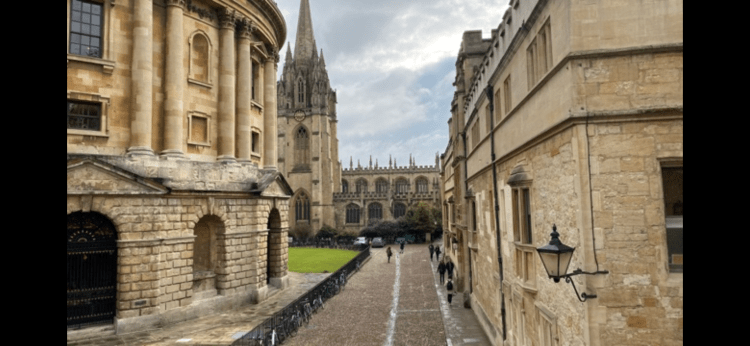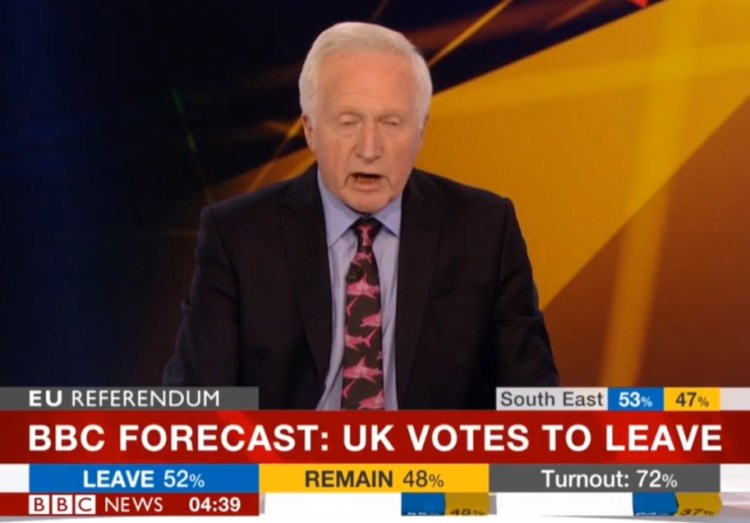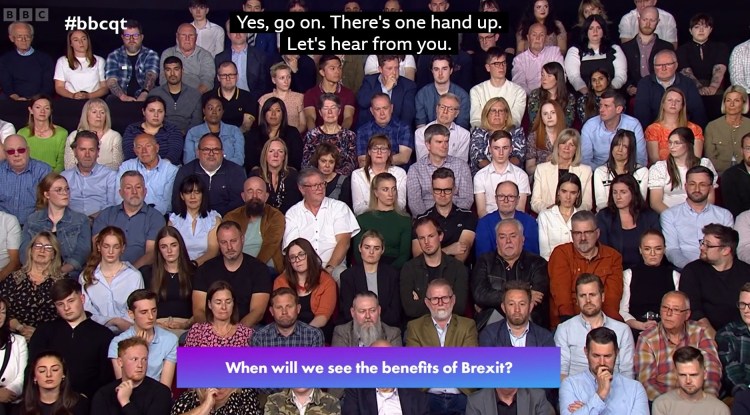Peter Burke
Chair
Oxford For Europe
23 June 2024
(To search the website or to comment on this piece please see foot of page)

Chair’s blog
Follow My Blog
Get new content delivered directly to your inbox.
Eight years to the day from that notorious referendum, should we just move on?
A midsummer night’s nightmare
Today is an anniversary many of us would very much rather not have had to celebrate, eight years since 23rd June 2016 the Brexit referendum, or “freedom day“ as some of the more deluded among us choose to call it. Their numbers are dwindling.
Like many of us I will never forget that nightmarish day. Unlike in elections, there was no exit poll, and many went to bed feeling certain that the bookies’ reassuring odds of 6/1 on Leave were an accurate reflection of the truth. Even Nigel Farage was prepared to concede defeat at 10 pm. It was only when the first votes came in, from Newcastle and Sunderland, that things started to look grim. As the night went by, the odds shifted and the pound dropped, until the famous (and factually incorrect) Dimbleby phrase: “The British People have spoken and we’re out”

The intervening 8 years divide roughly around the middle, with the first half being marked by impatience among the Europhobes to “get Brexit done“, and by a rearguard action by those who campaigned for a People’s vote, or at least for some effort to limit the damage. The second half has been taken up with a gradual realisation among the public that Brexit is nothing better than a severe act of self harm. “Project fear“ is more and more recognised to have been an accurate prediction. The O.B.R. forecast of a 4% cut to GDP is proving if anything to have been perhaps a little over optimistic.
But what matters is how people experience it in their daily lives. Many are learning that their jobs are less secure – or have disappeared - because of Brexit. It is harder to travel, to tour in Europe, to get certain foods. Sell by dates have become shorter. Medicince are more difficult to get hold of – with potentially life-changing consequences. As could’ve been predicted, skills shortages, not least in the NHS, have increased, and the pace of net immigration from outside Europe, both by regular and irregular routes, has risen dramatically. Even Nigel Farage has admitted that Brexit has failed, although of course, like so many others, he tries to tell us that a good Brexit would’ve been possible with an unspecified better plan. I don’t recall being told in 2016 that the success of Brexit was totally contingent on it being handled well. And any proposal whose success was predicated on the Tory party in government acting with wisdom and probity, was always questionable.
Farage can change his mind – why can’t we?
I need hardly remind you what the opinion polls are telling us. Approximately 2/3 of voters when asked say that Brexit was a mistake, and many of the remainder are still on the fence. More than half would wish to rejoin the EU given the opportunity. The Guardian’s recent visit to the staunchly Leave-supporting city of Stoke-on-Trent is an illustration of the disillusionment which is setting in. In this respect the voters are ahead of the politicians. Famously both of the major parties seem sworn to silence on the subject (although when pressed Rachel Reeves did acknowledge the truth of the O.B.R. figures). The liberal Democrats in their manifesto talk about the long-term aspiration of rejoining, but it is not something they are headlining.
I am no fan of BBC1’s Question Time. When it came to Oxford some time ago applicants for tickets were asked how they voted in the referendum. Among my acquaintances those who answered ‘leave’ were given preference – all in the name of ‘balance’ in a city in which such people are relatively rare. But 2 recent episodes are salutary.
In one, Fiona Bruce asked the audience to raise their hands if they knew of any benefits of Brexit. And in Chester, a Leave-voting city, it took a while for even one hand to go up. Its owner produced the most extraordinary piece of word salad centred around the word ‘independence’ but with not even a hint of how Brexit had benefited him personally. The others looked on in puzzlement.

‘Get used to it, the people have spoken’
The other Question Time episode was the Leaders’ Debate this week. The question was about ‘how Brexit has denied young people a future’ (applause). Sunak: ‘We had all these debates several years ago, I’m not going to re-litigate them. We had a referendum and the country decided… we’re not going to go back to Brexit, this is about the future.’ The best example of a benefit he could come up with was Freeports, which we know we could have had within the EU (because we did), and which of course are in all likelihood just a diversion of opportunities from one part of the country to another.
This was the Prime Minister who promised us ‘IPA’, ie integrity, professionalism, and accountability. In what universe does it amount to accountability when politicians brush off any reference to the harms of Brexit by blaming the voters, as if they themselves have no part in it? Appeals to the Will of the People still happen, though they tend to be more muted these days. After all, even the most ardent Brexiters know that the will of the people has changed dramatically, and it is now we pro-Europeans who are fighting to make that will heard. And of course those who give it a moment’s thought will realise that the disastrous hard Brexit we now have was never the will of the people. Nobody was asked whether they wanted to leave the Single Market or Customs Union. Many voted Leave after being told by Farage and others that outside the EU we would be like Norway, and that is what they thought they were voting for.
It is timely, 8 years on, to remember just how tenuous the Leave ‘win’ was, a 2% margin aided by lies and a total lack of informed consent – something which in my profession, medicine, is essential to any decision. A win in a non-binding referendum which might well have been declared invalid in the courts had it been binding. And a win which was interpreted by the victors as lending them a mandate to act as if the 48% did not exist, and to push the country way beyond anything what had been voted for. That is not democracy, it is a travesty of democracy. It is a profound discredit to both sides, those who knowingly promised unicorns and those who allowed them to get away with it.
Should we attempt to move forward in a spirit of unity and co-operation? Yes of course, if we can. But should we forget the harm done on that dark day 8 years ago and ‘move on’. Only when the harm has been undone. As George Santayana said “Those who cannot remember the past are condemned to repeat it.”
Keeping the flame alive
So just now, as some of our supporters ask ‘what are we fighting for?’ and I would answer that this is just the time to fight, to make it clear to the public that it is not treason to hope for better, that it is not too late to re-think that ‘decision’ of 8 years ago. If we do not keep the flame alive, who will? Oxford recently featured on the national tour of the Star of European Unity - lest we needed reminding.
Oxford for Europe is not party political. It takes no position on the forthcoming election. But it is within its rights to call upon politicians of all parties to tell the truth about Brexit, and to urge that we treat with great caution any whose defining policy is the perpetuation of the long-discredited Brexit myth.
Beware hubris
It was of course wholly unpredictable that the eighth anniversary of the referendum should fall so close to a general election. Labour in their campaign famously have tried hard to avoid talking about Brexit. In fact everybody’s talking about precisely their reluctance to talk. However, I wonder whether that reluctance extends to an unwillingness to learn the lessons of the referendum. If they have any sense, Labour leaders right now will be thinking of the Cummings-led gaslighting in the days running up to June 23, 2016. we now know although we might not have known then, that large numbers of potential remain voters were targeted on social media with the message that they need not bother going to the polling station because the outcome was in the bag. This year of course is a different decision and it will be made constituency by constituency. However it would not surprise me in the least if those proposing to vote for change were inundated with similar messages: ‘don’t bother, it’s done and a supermajority might even be harmful. Stay home’. Beware hubris. Politicians on all sides are saying ‘it’s not over until the last vote is counted’. Perhaps on this one occasion, they are right.
To mark this day, Jon Danzig has released a typically brilliant video, paying tribute to the 114 politicians who had the sense and principles to vote against triggering article 50.
The views expressed here are the author’s own and not necessarily representative of Oxford for Europe

If you wish to comment on this blog, please email [email protected]
Please also keep an eye out for our series of meetings featuring brilliant speakers. Details here.
See Also:
https://www.facebook.com/OfEcomms
https://www.facebook.com/oxfordstays
Twitter: @Oxfordstays
